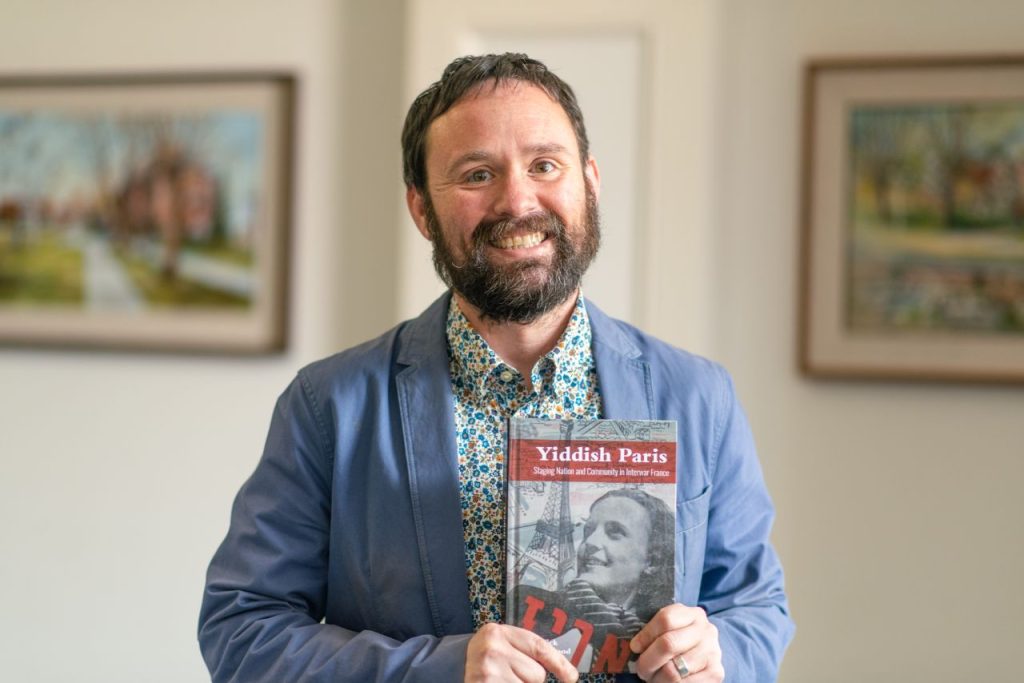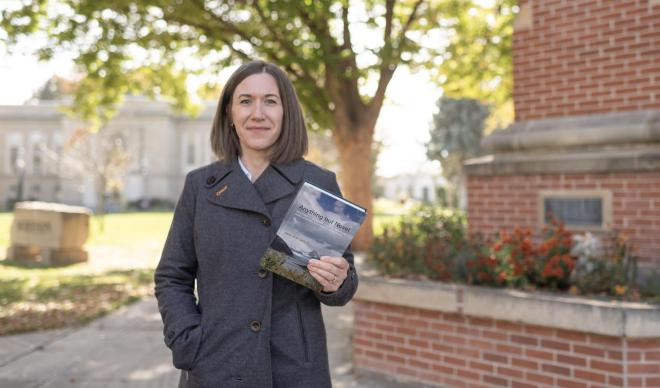Known for an interdisciplinary liberal arts education infused with transformative, culturally rich experiences, we not only harness your drive but direct it to all possible paths forward. Explore our academic majors and unlock a world-class curriculum that allows College of Idaho graduates to leave our college campus ready to make their mark in the professional world. Discover your passions, ignite your curiosity and learn how you can enrich and impact our world.
But don’t forget that studying at The College of Idaho is about more than just your major. With the College’s Coyote Core, you’ll explore diverse disciplines, embrace different perspectives, and develop practical skills that empower you to make a real impact on the world. Plus, you can pursue a variety of minors, specializations, certificates and dual degrees, and step outside the traditional classroom and immerse yourself in high impact experiences – all as part of your journey at the College. Turn your dreams into reality and unlock endless possibilities.
The College of Idaho offers two majors in accounting: Accounting 124 (BA) and Accounting 150 (BS).
An Accounting 124 (BA) major is completed in 124 credits and equips students with essential financial reporting and business fundamentals skills. Courses such as Financial and Managerial Accounting, Intermediate Accounting, and Business Law build a strong foundation, while hands-on experience with accounting information systems or data analytics, and a capstone project prepare graduates for successful careers in accounting and finance. Accountants have versatile skills that are essential across a wide range of industries. Graduates can work in corporate accounting, government, nonprofit organizations, healthcare, financial services, manufacturing, etc.
The Accounting 150 (BS) major is completed in 150 credit and is designed for students to meet the CPA (Certified Public Accountant) exam eligibility requirements for the State of Idaho. This CPA preparation-focused accounting major provides students with in-depth knowledge and skills essential for the CPA exam and professional practice. Core courses in financial reporting, auditing, tax, and managerial accounting, combined with hands-on experience with an accounting internship prepare graduates for careers in public accounting, corporate finance, and beyond.
The Anthropology & Sociology major (BA) takes an interdisciplinary approach to the study of anthropology and sociology, two fields that share a methodological, theoretical, and historical heritage. Sociology examines social organization, stratification, and interactions, while anthropology focuses on cultural values/practices, beliefs, and shared meaning-making. Both enrich our capacity to critically analyze the social and cultural conditions of human life.
The science of chemistry lies at the intersection of Biology, Physics, and Mathematics. Thus, exploration of the material encompassed by this scientific discipline has the capacity to prepare students for wide variety of future professional endeavors. The Applied Chemical & Biomedical Sciences (BA) major has been intentionally crafted to allow the course of study to be tuned to compliment the specific academic or professional goals of the student.
The primary purpose of the Art (BA) major is to foster creativity, critical thinking, and an understanding of the practice and history of the visual arts. We seek to help students develop visual literacy, problem-solving abilities, and technical skills that will enable them to confidently explore possible avenues for creative expression in the visual arts.
The Biochemistry major is an interdisciplinary program with foundational studies in Chemistry, Biology, Physics, and Mathematics. This major is ideal for students with interest in pursuing graduate studies in biochemistry or related fields such as drug development; pursuing careers or graduate studies in medical, dental, veterinary, or related fields; or pursuing a career in research or laboratory work.
The College of Idaho offers a BA (Bachelor of Arts) and a BS (Bachelor of Science) in Biology. Our Biology major offers a research-focused curriculum taught by faculty who are committed to mentoring and engaging students in the process and interpretation of science. Consistent with the liberal arts tradition, our faculty's objectives are to give students a strong foundation in the natural and biological sciences.
Our alumni include the co-discoverer of vitamin B12 and many successful doctors, physician assistants/associates (PAs), nurses, dentists, physical therapists, veterinarians, pharmacists, researchers, botanists, zoologists, professors, and scientists. Graduates enjoy a high placement rate into graduate school, and many undergraduates get a head start on their research careers through grant-funded faculty-student research programs such as INBRE (IDeA Network of Biomedical Research Excellence) and SWITCH (Southwest Idaho: The Comprehensive Herbaria).
The College of Idaho’s Biomedical Science major is designed for students interested in careers in health professions, such as doctors, physician assistants/associates (PAs), dentists, physical therapists, optometrists and more as well as students interested in research in biomedical sciences.
Business Administration major offers a comprehensive education in core areas, such as management, finance, marketing, and accounting, preparing students for diverse careers in today’s dynamic economy. Through hands-on projects, case studies, and an internship, students gain practical skills in strategic business practices. Graduates emerge ready to excel in corporate, nonprofit, and entrepreneurial roles, equipped with the critical thinking and adaptability needed for success across industries.
The Bachelor of Science in Chemistry major offers study in the core areas of general, analytical, organic and physical chemistry as well as further study in mathematics and physics. The major is designed for students with a serious interest in a rigorous and challenging program, especially for those students who plan to continue to medical, dental and veterinary school and PhD and Masters programs.
The Computer Science-Mathematics major prepares students for a broad variety of careers and for graduate study. Work in computer science includes software development and design, research in solving problems in computing (including data storage, networking, retrieval, organization, validation, and so on), and research into new ways of using computing devices (computer vision, robotics, machine learning, accessibility studies, etc.). Computer science is one of the most rapidly expanding and changing fields of scientific inquiry. Preparation for work in this field is thus inherently interdisciplinary, requiring a strong mathematical background. The problem-solving capabilities acquired in the Computer Science-Mathematics major are of wide utility in many fields of study, including careers directly and not directly connected to computer science.
The Criminology major offers a distinctly liberal arts approach to understanding crime, its causes, and our responses to it from multiple disciplinary perspectives. Students study crime data and trends, how criminal justice systems function, and theories of crime and punishment. Beyond the shared core courses, students will have the opportunity to explore a wide range of criminological topics across various disciplines. The strong analytical, research, and communication skills students develop in this major will prepare them for both graduate school as well as careers in a diverse range of fields, including law, advocacy, criminal justice, social service, and public policy.
Students pursuing a Digital Marketing major are introduced to essential concepts in business, marketing, and digital strategies related to search, social, and content creation. Online interactions are the leading force that drives organizations to get their message out to consumers. The courses in this major meet the rapidly shifting digital landscape in today's internet-driven world. The Digital Marketing major provides a combination of business and digital courses focused on this emerging area within the marketing field.
The College of Idaho offers a Bachelor of Arts (BA) in:
Our four-year teaching certification program emphasizes preparing educators for Idaho schools. It encompasses undergraduate study toward completion of a BA degree and an internship semester of student teaching to complete remaining licensure requirements.
The College of Idaho’s Engineering Dual-Degree major is designed for students interested in combining a liberal arts experience with an engineering education. Through this major, students complete the major requirements at the College and then transfer to one of our partner schools. Students may focus their course of study in any field so long as they complete the required courses identified in this major. This major makes it easier for students to identify the courses necessary for the most popular engineering fields.
Ours is an age when both non-human and human well-being depend on reframing conventional questions and developing ourselves as agents of intellectual change. Through the Environmental Studies major, we seek to understand the complex and influential interactions between the conceptual and the material aspects of human-environment relations.
Environmental Studies prepares skilled critical thinkers who are ready to provide leadership in a variety of career fields. Education, public policy, resource management, public health, public administration, international development, non-profit work, and the sciences are popular choices for our graduates. Many alumni also go on to graduate school to study environmental law and policy, economics, environmental literature, plant and animal biology, and other related sciences.
Through the Bachelor of Art degree in Exercise Science, students will be challenged to apply analytical, biological, chemical and physical principles to health and human performance. Students first take introductory biology, human anatomy and physiology, and health and wellness courses to build fundamental knowledge of the human body before moving into exercise-specific coursework that include exercise physiology and principles in biomechanics. Graduates of the Exercise Science program will understand how the structure and function of the human body respond to different exercise stimuli, appreciate the factors important for wellness as a basis for personal choice, be competent in data collection and analysis, and engage in experiential learning opportunities such as collaborative research or substantive internships. The program prepares students for careers in the health professions such as physical therapy, occupational therapy, nursing, athletic training, physician's assistant, as well as cardiac rehab, exercise physiology, biomedical research, health promotion and education, coaching, personal fitness, sports psychology, motor development, and teaching.
The Bachelor of Science program emphasizes the application of analytical, biological, chemical, and physical principles to understand the human body’s response to exercise. Students begin with foundational coursework in biology, human anatomy and physiology, and health and wellness to develop a strong understanding of human biology. They then progress to more specialized subjects in exercise physiology, biomechanics, and related fields.
The College of Idaho offers both a Bachelor of Arts (BA) and a Bachelor of Science (BS) in Exercise Science, which use exercise as the lens to analyze human performance and human health.
The Finance major provides an understanding of financial markets, investment analysis, and corporate finance principles. Coursework covers essential topics like risk management, financial modeling, portfolio analysis, and capital budgeting. Through hands-on projects and an internship, students gain practical skills in quantitative analysis and strategic financial decision-making. The program emphasizes ethical financial practices and adaptability, preparing graduates for diverse careers in areas such as investment banking, corporate finance, wealth management, and financial consulting. This major equips students with the expertise needed to thrive in today’s dynamic financial landscape.
You will find history isn't contained simply in the pages of a textbook at The College of Idaho. Our engaging faculty breathe life into the events that have shaped human history, and you will find plenty of opportunities to interact with history first-hand from visiting historically significant sites overseas to performing in-depth historical research. Our History majors graduate with a knowledge of historical methodology and research, as well as a foundation in the histories of at least four regions of the world. The study of history is rewarding for students with any program of study but is particularly suited to students pursuing careers in business, law, teaching, health sciences, media, or the arts and humanities, where an understanding of human experience is particularly valuable.
International Affairs investigates the political, economic, and social relations between countries and within countries. As an interdisciplinary program of study, course topics span political philosophy, political economy, comparative studies, economic development, international law, history, geography, and regional studies. It cultivates transferable skills in research, analysis, data interpretation, evidenced-based argumentation, policy evaluation, collective decision-making, cultural awareness, and global literacy.
The Literature and Creative Writing major offers study in the areas of American, British, and postcolonial literature and creative writing (poetry, fiction, and nonfiction). The major is designed for anyone interested in literature and writing and prepares one for a wide variety of careers and graduate programs, including but not limited to writing, editing, teaching, publishing, journalism, law, marketing, public relations, and the fine arts.
For centuries, mathematics has given its students a lifetime of intellectual excitement, deep creative satisfaction, mental acuity and agility, and appreciation of an austere and elegant beauty. More than anything else, the study of mathematics enhances the student's power of thinking. Mathematics majors at The College of Idaho learn to think, both deeply and creatively, about a wide range of important and interesting topics and areas of mathematical inquiry. Our Mathematics majors learn the fundamental principles of mathematical thought as they progress through the Mathematics Core. They also begin to gain an understanding of the relevance and utility of mathematics to, and interconnectedness with, other disciplines of the liberal arts and the world as a whole. This program of study is completed with choices from a broad selection of proof-based courses. The curriculum reflects the intellectual sweep of undergraduate mathematics and the applied, interdisciplinary sensibilities of the Department of Mathematics and Physical Sciences.
The Music major helps students improve their musicianship while providing an in-depth study of music and its place in culture. Students also gain professional knowledge to help them in careers or graduate school related to digital visual and audio production and the larger music industry.
Studying music at the College produces graduates who are able to think deeply about music and perform at a high level. The College has produced an Academy Award-winning composer and many other successful musicians. Professional performance, musical theatre, teaching, writing, composing, conducting and producing are common careers for our graduates, though a College of Idaho music degree prepares its holder to succeed in a wide variety of work environments.
The Physics-Mathematics major provides an excellent basis for many post-college paths, including teaching, engineering, industry or tech-related business fields, and graduate study in physics, astronomy, and engineering. Our majors enjoy a wide variety of after-college options because they undergo training to become independent problem solvers who utilize both physics and mathematics and who can effectively communicate their understanding.
Political economy is an excellent field for students interested in how society organizes itself through government, the market, and non-governmental actors. It is a fine complement for programs that are affected by political economic forces both domestically and globally.
The Psychological Science major is designed for students to gain foundational knowledge and empirical skills and then progress to more advanced work. Students also experience growth in social and personal skills such as teamwork, ethical and social responsibility, self-regulation, and project management. Psychological Science majors complete a thesis project in their graduating year. Career exploration is an essential part of the psychology programs; students examine how to enter the workforce directly after graduation and how to continue their education through graduate and professional training. The Psychological Science major emphasizes depth in empirical knowledge and skills and requires a psychology research thesis project.
The Psychology major is designed for students to gain foundational knowledge and empirical skills and then progress to more advanced work. Students also experience growth in social and personal skills such as teamwork, ethical and social responsibility, self-regulation, and project management. Psychology majors complete a thesis project in their graduating year. Career exploration is an essential part of the psychology programs; students examine how to enter the workforce directly after graduation and how to continue their education through graduate and professional training. The Psychology major emphasizes student choice in survey courses and focuses on an applied thesis experience.
A Spanish major develops student proficiency in the language and an understanding of cultures in Spanish-speaking societies. Students develop advanced language skills in speaking, understanding, writing, and reading, and learn about the history, literature, and cultures of Spanish-speaking countries. Understanding Spanish language and Spanish-speaking cultures offers students many professional opportunities in today’s global society.
A Spanish Language & Business major develops student proficiency in the language and an understanding of cultures in Spanish-speaking societies. Students develop advanced language skills in speaking, understanding, writing, and reading, and learn about the history, literature, and cultures of Spanish-speaking countries. Understanding Spanish language and Spanish-speaking cultures offers students many professional opportunities in today’s global society. A degree in Spanish Language & Business prepares students for a range of careers in local businesses, international corporations, government agencies, non-profits, or any organization needing bilingual skills and knowledge of Spanish-speaking markets.
Dr. Stelios Panageotou (Political Economy) discusses a recent Idaho Policy Forum hosted by the College deconstructing the results of the election and what Idahoans can expect over the next four years.

Professor Diane Raptosh ‘83 (English) recently published another book of poetry “I Eric America,” which was highlighted in an interview with the Idaho Press. She has published multiple books, been named Boise’s Poet Laureate, and earned three distinguished fellowships from the Idaho Commission on the Arts.

Dr. Nick Underwood (History) traveled to New York, Frankfurt, Amsterdam and Jerusalem to research his recent book, Yiddish Paris, that is, literally, the first of its kind. “It was a real, wild chase to find the materials that I needed to put this whole thing together,” he said.

Dr. Jennie Daniels (Spanish) recently published her first book, which examines four different historical novels from Brazil, Argentina, Ecuador, and Chile. The book extends threads of hope, as each of the four authors whose writings are explored in “Anything but Novel” offers the opportunity to address the social issues being brought to light.
Your innovative spirit has propelled you this far. What’s next? That’s for you to dream, make, live and unleash at The College of Idaho. Come see what awaits you here.